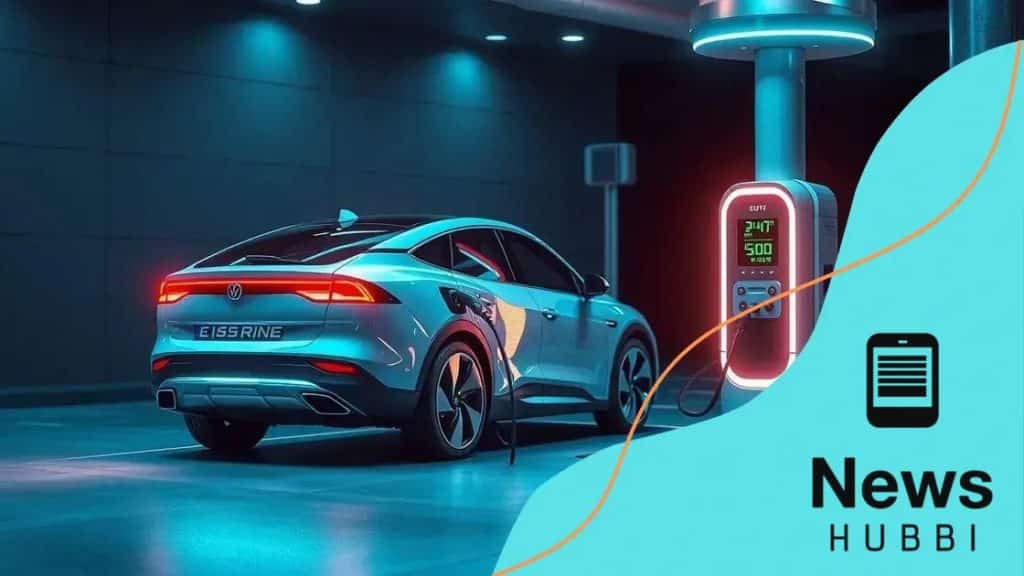Breakthroughs in battery technology for electric vehicles

Anúncios
Breakthroughs in battery technology for electric vehicles, such as solid-state batteries and improved energy density, are enhancing performance, range, and safety while promoting sustainability in the automotive industry.
Breakthroughs in battery technology for electric vehicles are changing how we think about transportation. Imagine driving longer distances without the constant worry of recharging—this is becoming a reality as new advancements unfold. Curious about what’s next?
Anúncios
The evolution of electric vehicle batteries
The evolution of electric vehicle batteries has been remarkable. Over the past few decades, these batteries have changed significantly, leading to better performance and efficiency. In the early days, most electric vehicles used lead-acid batteries, which had limited capacity and a short lifespan. However, advancements in technology have brought us to the point where lithium-ion batteries dominate the market today.
With lithium-ion batteries, electric vehicles can travel much farther on a single charge. This improvement has been crucial for the adoption of electric cars. In fact, the most recent models are now capable of covering over 300 miles on a single charge. This is a game changer for consumers who are concerned about range anxiety.
Key Developments in Battery Technology
Several innovations have influenced the development of electric vehicle batteries:
Anúncios
- Higher energy density: This allows batteries to store more energy in less space.
- Faster charging speeds: Advances mean you can recharge in under an hour.
- Improved lifespan: Modern batteries can last for thousands of cycles, reducing the need for replacements.
- Safer materials: New safety protocols have minimized risks of overheating.
Each of these developments has paved the way for electric vehicles to become more appealing. Consumers are increasingly choosing to go electric, thanks to improvements in battery technology.
Research is ongoing, focused on developing solid-state batteries. These batteries promise even greater efficiency and safety. They could revolutionize the electric vehicle industry by significantly reducing weight and improving range.
The future of electric vehicle batteries is bright, with many companies competing to bring the best technology to market. As these advancements continue, we can expect to see electric vehicles becoming a mainstream choice for all drivers.
Key technologies driving battery breakthroughs
Key technologies driving battery breakthroughs have transformed the electric vehicle landscape in recent years. These advancements enable faster charging, increased range, and improved battery life. Understanding these technologies can help consumers and manufacturers alike appreciate the rapid evolution happening in the industry.
One of the most significant technologies is the use of solid-state batteries. Unlike traditional liquid electrolyte batteries, solid-state batteries use solid materials to conduct electricity. This change leads to higher energy density and improved safety. With these batteries, electric vehicles can become lighter and travel further on a single charge.
Other Important Technologies
Several key innovations are also shaping the future of battery technology:
- Graphene batteries: These batteries incorporate graphene, allowing for faster charging and longer lifespan.
- Fast charging systems: Technologies that enable electric vehicles to recharge in under 30 minutes are making them more convenient.
- Battery management systems: These systems monitor battery health and optimize performance, extending battery life.
- Recycling technologies: Improved recycling methods allow for the recovery of valuable materials, reducing environmental impact.
As these key technologies develop, they not only enhance existing electric vehicles but also pave the way for new models. This ongoing innovation is crucial for meeting the demands of an expanding market.
Additionally, advancements in energy density and sustainability are driving research. Manufacturers are striving to create batteries that are not only efficient but also environmentally friendly. This focus helps ensure that the future of electric vehicles is both practical and responsible.
Impact on electric vehicle performance

The impact on electric vehicle performance is significant due to advancements in battery technology. Improved batteries not only enhance the overall efficiency of electric vehicles but also affect speed, range, and driving experience. As batteries evolve, so do the capabilities of electric vehicles, making them more appealing to a broader audience.
One of the most notable changes is the increase in range. Enhanced energy density allows electric vehicles to travel longer distances without needing frequent charges. Many modern electric cars can exceed 300 miles on a single charge, a milestone that addresses consumer concerns about range anxiety.
How Battery Technology Boosts Performance
Key areas of performance improvement include:
- Acceleration: Advanced batteries provide higher power output, resulting in quicker acceleration times.
- Regenerative braking: Newer battery systems utilize regenerative braking more efficiently, converting kinetic energy back into stored energy.
- Weight reduction: Innovations in battery design help reduce overall weight, improving handling and efficiency.
- Durability: Improved battery chemistry enhances durability and longevity, ensuring consistent performance over time.
Beyond just range and speed, these enhancements create a better overall driving experience. Drivers enjoy smoother rides, responsive handling, and a quieter operation. This combination attracts new customers and increases satisfaction among existing electric vehicle owners.
As technology continues to advance, the performance of electric vehicles will further improve. Innovations are constantly being made to optimize battery efficiency and integrate smart technology to enhance user experience. Overall, the improvements in battery technology directly influence how drivers perceive electric vehicles today.
Challenges in battery development
The challenges in battery development are significant as the demand for electric vehicles continues to grow. Despite the rapid advancements, several obstacles stand in the way of achieving optimal battery performance and sustainability. One major challenge is the cost of materials. Many of the essential materials for high-capacity batteries, like lithium and cobalt, are expensive and often scarce, which can limit production.
Another challenge is ensuring safety. As battery technology advances, the risk of overheating and battery failure also increases. Manufacturers must develop robust safety measures to prevent incidents, which can complicate the design process. These issues have led to a focus on creating batteries that not only perform well but also prioritize user safety.
Environmental Concerns
Environmental impacts also pose significant challenges:
- Mining practices: Extracting metals for batteries can lead to environmental degradation and pollution.
- Recycling: Currently, most batteries are not recycled effectively, leading to waste and resource depletion.
- Carbon footprint: The production process often involves high energy consumption, contributing to emissions.
- Material sourcing: Ethical sourcing of materials like cobalt remains a pressing issue.
Additionally, there is a need for longer battery life. Users expect batteries to last longer and perform well over time, which puts pressure on developers. Creating a battery that maintains performance through many charge cycles without degrading is essential for consumer satisfaction.
Finally, technological innovation must keep pace with increasing demand. As more consumers shift to electric vehicles, the pressure to develop better, cheaper, and more sustainable batteries grows. Overcoming these challenges will be crucial for the long-term success of electric vehicles and the battery market as a whole.
Future trends in battery technology
Future trends in battery technology are exciting as they promise to redefine how we use electric vehicles (EVs) and renewable energy. Several key advancements are poised to enhance performance, safety, and sustainability. As research continues, we can expect to see major improvements that will benefit not just the automotive industry but the entire energy landscape.
One significant trend is the development of solid-state batteries. Unlike traditional lithium-ion batteries that use liquid electrolytes, solid-state batteries utilize solid materials. This helps increase energy density and safety while reducing the chances of leakage and fires, making them promising for future EVs.
Innovations on the Horizon
Another trend is integrating AI and machine learning into battery management systems. These technologies can optimize battery usage by predicting charging cycles and improving overall efficiency. By using data, manufacturers can enhance the battery’s lifespan and performance.
- Circular economy practices: Companies are increasingly focusing on recycling materials to create a sustainable battery lifecycle.
- Fast-charging technology: Innovations will reduce charging time significantly, allowing users to recharge in minutes rather than hours.
- Environmentally friendly materials: Research into alternative materials reduces reliance on rare metals, lowering costs and environmental impact.
- V2G technology: Vehicle-to-grid technology will allow EVs to feed energy back into the grid during peak demand, improving energy efficiency.
As these trends progress, electric vehicles will become more practical and appealing for everyday use. The push for sustainability will not only lead to environmentally friendly solutions but also make electric vehicles a crucial part of global efforts to combat climate change.
Ultimately, the future of battery technology is bright, with innovations paving the way for longer-lasting, safer, and more efficient electric vehicles.
FAQ – Frequently Asked Questions about Breakthroughs in Battery Technology for Electric Vehicles
What are solid-state batteries?
Solid-state batteries use solid electrolytes instead of liquid, leading to improved safety and higher energy density.
How does electric vehicle battery technology impact range?
Advancements in battery technology allow electric vehicles to travel longer distances on a single charge, diminishing range anxiety for drivers.
What environmental concerns are related to battery production?
The extraction of materials for batteries can lead to environmental degradation, and recycling processes are often inefficient, contributing to waste.
What innovations are expected in future battery technology?
Future innovations may include faster charging solutions, AI integration for battery management, and the use of more sustainable materials.





